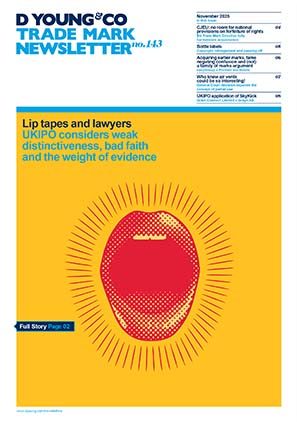BICC disappointment in passing off dispute: IPEC examines chain of title, goodwill and folk memory
In a recent Intellectual Property Enterprise Court (IPEC) case, recorder Amanda Michaels dismissed Prysmian Cables & Systems’ passing off claim in respect of M/S Apple International’s use of the name BICC COMPONENTS in the UK.
The claimant alleged that it owned goodwill in the BICC name and was successful in proving misrepresentation and damage. However, its passing off case ultimately failed because the available evidence did not demonstrate that goodwill in the BICC mark had been validly transferred to the claimant, following the sale of BICC Plc’s cables business in 1999.
The IPEC also found that the claimant could not rely on residual goodwill in the BICC brand.
Background
The claimants case was as follows:
- by February 2000 the BICC cables business (including goodwill in the BICC name) was transferred from BICC plc to General Cable Corporation;
- the BICC cables business was subsequently acquired by Pirelli SpA through a share purchase agreement (at which point the cables business was rebranded to BICON); and
- shares in the Pirelli cables business were sold in 2005 to a company which would later become the claimant.
The defendants challenged the claimant’s chain of title, and further argued that even if the goodwill had been validly transferred it was abandoned or extinguished through 17 years of non-use and the rebrand from BICC to BICON.
Chain of title
The judge examined in detail the sales and purchase agreements between BICC plc, GK Technologies and General Cable Corp in 1999 (GCC agreement), and between General Cable Corp and Pirelli SpA.
Having construed the contracts, the judge found that the GCC agreement provisions were inconsistent with a transfer of goodwill:
- the BICC name and trade marks were not included in a schedule of BICC Plc’s IP rights which were being transferred to the purchaser;
- a condition of sale was that the purchaser would remove BICC from the name of each of its group companies;
- even if the purchaser was given a limited licence to use the BICC name, that licence only applied to members of the GK Technologies group. Thus, if there was a licence to GCC it would have ceased following the share sale of GCC to Pirelli;
- finally, Pirelli’s rebrand from BICC to BICON in 2000 was indicative that at the relevant time the Pirelli/the claimant did not believe it had the right to use the BICC mark, and therefore chose to adopt the BICON mark in the hopes that it would link to the BICC mark’s heritage.
The evidence before the IPEC indicated that Pirelli/the claimant had never used the BICC mark and, therefore, if any goodwill in BICC had indeed been validly transferred the claimant abandoned it in favour of its new BICON mark.
Folk memory
The judge considered whether, had the goodwill been validly transferred, it would have been lost by attrition, or whether the claimant could still have relied on residual goodwill, or “folk memory”, in the BICC name (notwithstanding the non-use and rebrand).
It was significant that the claimant had never informed the market that the BICC brand was being discontinued, but had sought to trade off BICC’s legacy and heritage through use of the BICON mark.
It also informed consumers that BICON products satisfied the same standards.
While the claimant had made some efforts to retain BICC’s reputation, the judge pointed out that:
- reputation is not the same as residual goodwill/folk memory;
- there was insufficient evidence showing that consumers perceived there to be an association between BICC and the claimant; and
- the claimant could not rely on a predecessor’s residual goodwill in a sign which it had not used post-acquisition.
As a result, the claimant did not own the goodwill in BICC, resulting in the dismissal of its passing off claim.
It is worth mentioning that, if the chain of title and abandonment issues had been overcome by the claimant, the IPEC would have found that the remaining goodwill was capable of protection, and that the defendants’ attempts at gaining a commercial advantage, through references to BICC’s heritage, would have amounted to a misrepresentation that caused damage to the claimant’s business.
In short
To avoid chain of title disputes and costly litigation, it is strongly advisable to keep contemporaneous records where IP rights are being transferred, fully document such transfers in assignment agreements, and, where appropriate, record changes of ownership before the UK Intellectual Property Office (UKIPO). In so doing brand owners can safely rely on and protect their valuable IP rights.
Case details at a glance
Jurisdiction: United Kingdom
Decision level: High Court (IPEC)
Parties: PRYSMIAN CABLES & SYSTEMS LIMITED (claimant) and M/S APPLE INTERNATIONAL, RAJESH MANHARLAL SANGHVI, BICC COMPONENTS LIMITED, SPECIALISED WIRING ACCESSORIES LIMITED and TERMINATION TECHNOLOGY LIMITED (defendants)
Citation: [2023] EWHC 2176 (IPEC)
Date: 07 September 2023

